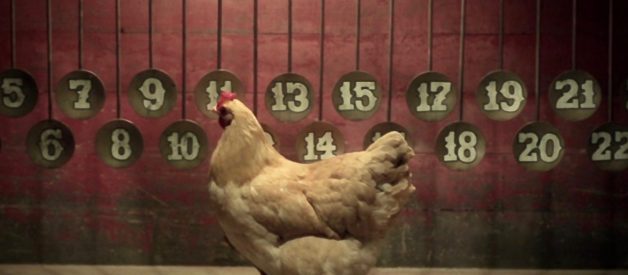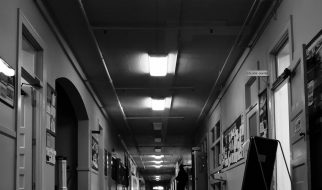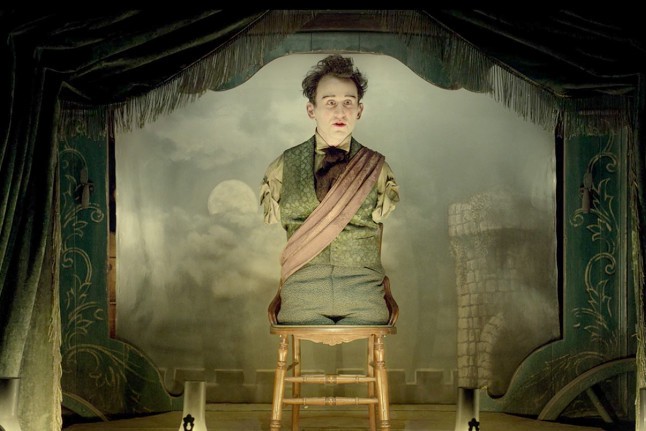 The Artist (never known as Prince)
The Artist (never known as Prince)
(I would be remiss in my role as a budding Internet film critic, were I not to warn you of the many ?spoilers? contained within the following text. This isn?t a review intended for people who haven?t seen the movie yet, but rather a critique for people who have already seen the movie and/or want to dive real deep into what it?s all about. I am such a person, and nobody else seemed to be writing this sort of article, so here I am with Part 3.)
Speaking of which, here I am with Part 1
And here I am with Part 2
Part 4
Part 5
And we?ll all meet at Part 6
The latest from the mighty Coen Brothers, rich in its variety and encoded meaning, includes all the recurring themes that have formed a shifting backdrop to their beguiling stylistic imprint these 35 years. Their films walk a tightrope between screwball comedy and brutal violence, and The Ballad of Buster Scruggs is as extreme an example of both as we have yet seen ? as graphic and mean-spirited as No Country for Old Men, as cartoonish and comical as The Hudsucker Proxy. Behind that stylized Sturges/Peckinpah surface lies a master spectrum from ?zany schemes gone terribly wrong? (Blood Simple, Raising Arizona, Fargo, The Man Who Wasn?t There, Burn After Reading, etc.) to ?existential acceptance of the unjust whims of fate? (A Serious Man, The Big Lebowski). Buster Scruggs meets us out on the latter end. As stated most clearly in the ?Near Algodones? vignette, life is absurd and nothing can be certain, so we may as well meet our fate with style and good nature. Our third chapter, ?Meal Ticket,? introduces us to our most passive and accepting Coen lead yet: Professor Harrison, The Wingless Thrush.
The credits call him simply ?Artist,? and his traveling companion ?Impresario,? but his stage name is seen on posters that his partner (a wounded and haggard Liam Neeson) hangs up in every town they visit. Aside from the Artist?s orations, it?s got almost no dialogue ? four lines, by my count ? which invites comparison to ?All Gold Canyon? and touches upon the love-hate relationship with verbosity found throughout this film. While there was a clear shift in tone between the first two chapters ? the sadistic and magical realist aspects of ?Buster Scruggs? dialed down to a more relatable and realistic goofiness in Chapter 2? here we experience a steep descent into silent, humorless, stark reality. There are no jokes. Nothing is pretty. Nobody is happy. There are no action sequences, no gunfights, no conversations, no clever directorial flourishes. It might be the most joyless thing the Coen Brothers have ever committed to film ? even The Man Who Wasn?t There maintains a nervous undercurrent of humor and showy expressionistic cinematography. ?Meal Ticket? is dismal, and all the more brilliant for it.
If you take a gander around the social networks, you?ll find a recurring opinion (one with which I stridently disagree) that the first episode of Buster Scruggs was great, the second one was good, and they kept getting worse after that. I credit the precipitous plunge in the film?s mood which takes place in Part 3. As we exit ?Near Algodones,? there is every reason to expect this movie to stay pretty lighthearted, a dark Coen farce. The absurdist premise of ?Meal Ticket? (quadriplegic actor and his drunk dad seek fame and fortune in the Wild West) is a sort of red herring that suggests the laughs are yet to come. They are not.
Printed beneath a portrait of a handsome face, shadowed and under-lit, his eyes turned skyward, is this chapter?s opening quotation: ?The quality of mercy is not strained. It droppeth as the gentle rain from heaven.? This is from The Merchant of Venice, a singular Shakespeare tragicomedy about a racist nobleman who negotiates a loan from a wealthy Jewish moneylender with a pound of his own flesh as collateral, and the legal antics which result when he can?t pay it back. The line is part of an impassioned speech made by Portia, a heroine of the play who cross-dresses as a male lawyer in order to represent her imperiled friend against the vengeful Shylock in court. We?ll get back to it.
An unseen hand turns the illustration page, revealing an opening paragraph which describes the bitter cold of a desolate wilderness, and how the Artist is content to sit and watch out the back of his wagon. We see that same reality in our establishing shot, which as in the two preceding chapters is a panoramic image of a man and a horse against a classical Western outdoors. The Artist isn?t shown yet ? the Coens wrote him into the very start of their prose story, but in the filmed version they delay his reveal until the first opening of the curtain. As we get to know him over the first half of this episode, it seems that the Artist isn?t happy exactly, but enjoys his life well enough. He likes to travel and see the scenery go by, and seems to derive artistic satisfaction from his performances as long as the audience is with him. In a later scene, he catches snowflakes on his tongue like a sweet child. His fate is a harsh one, yet he meets it with acceptance and good humor. We see some of this in Liam Neeson?s character as well. He too seems to derive artistic satisfaction from their modest show ? there?s a certain light in his eyes while he puts on the Artist?s make up, and a practiced care in transforming his wagon into a stage complete with gaslights and curtains. ?Impresario? is an old-fashioned term for a person who creates spectacular shows ? not a writer or director but more of a producer, the one who brings all the necessary people together to make the magic happen. Florence Ziegfeld with his Follies, Richard D?Oyly-Carte and his grand productions at the Savoy Theatre ? these are famous impresarios. To assign that descriptor to the man who puts on the Wingless Thrush show is both a bit of a derisive joke and an insight into how the character views himself. Throughout the episode, we?re shown glimpses of words painted on the wagon?s exterior which seem to describe a larger and more successful show. Both the front and back of the wagon are labelled ?Thalia?s Sedan,? suggesting there was once a woman on the road with them, likely a wife and the biological or figurative Mother to the Artist (though ?Thalia? might simply be an allusion to the Greek goddess of festivity). Other inscriptions include: ?The Best Show in the West,? ?Fantastic Arts,? ?Comedy / Tragedy,? and a painting of an Egyptian sarcophagus. It?s an old and faded paint job, the implication being that we?re meeting the Impresario at a low point in his career. However they?re related, it seems these two are the last remaining members of a grand troupe, their creative fire dimmed but not extinguished.
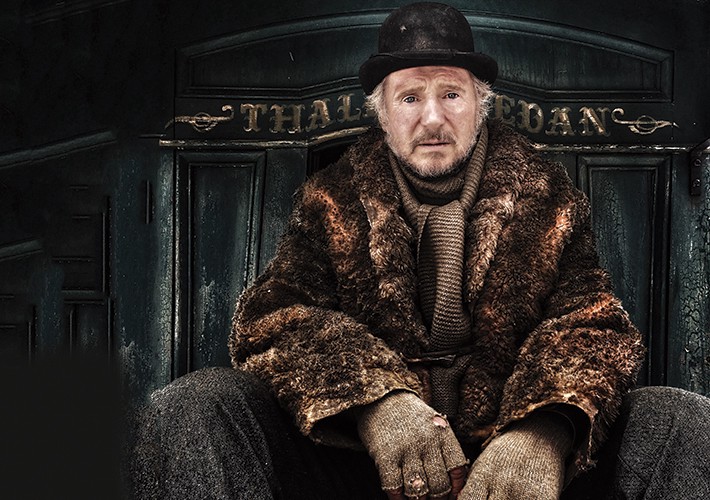 The Impresario
The Impresario
As he passes the hat to their first and most receptive audience, the Impresario can be heard mumbling a story about having found the Artist in the streets of London with no arms or legs, and no Mother to care for him. Is this story true? Their relationship most resembles that of father and son. Whether or not that?s the case in a biological sense, unavoidably they have developed a surrogate father-son relationship because of their relative ages and the long time they?ve been together (long enough to travel from England by ship and establish a well-practiced show, at the least). Could they be brothers, hence the inclusion of the Cain and Abel story in the Artist?s orations? Joel and Ethan Coen have disappointed more than one interviewer with their comfortable embrace of ambiguity. Like their peer David Lynch, the Coens? films give the impression of hidden meaning and developed background stories that they are unwilling to explain.
We watch the Impresario hang up posters around a small frontier town, convert his wagon into a stage, fire up a set of footlights, then wait pensively to see how much of a crowd will show up. Hard men in buckskins and fur make their way to the wagon, carrying their own makeshift chairs, and form a nice-sized crowd. Satisfied that his promotional work has paid off, the Impresario retires to his station backstage. The scene is played for anticipation. The sun is setting, the audience is waiting, and at last the time is right and the Impresario opens the curtain to reveal Professor Hastings, a young man with no arms or legs, strapped into a chair before a backdrop made up to resemble a high castle wall on which he?s standing, a full moon in the painted sky beyond. The Artist?s orations are filmed and set in such a way as to convey their high quality. A magical stillness settles over these scenes, especially the first one. We?re shown the reactions of the eager and responsive showgoers ? the Artist has them in the palm of his hand, so to speak. They will remember this show forever. Living as they do, it might be the finest show they witness in their lives. One is reminded of the musical interludes in Inside Llewyn Davis, with their shallow depth of focus and their authentic stage lighting, recorded with the ambient sound of a quiet room. Like the disagreeable Mr. Davis, our central pair?s lives are filled with disappointment and frustration. On stage, like him, they experience a transcendent glamor that passes from performer to audience; and they have chased this glamor all the way to a desolate wilderness and its entertainment-starved inhabitants.
The first piece he recites is Percy Bysshe Shelly?s ?Ozymandias,? a poem about the ruins of a great marble statue in a vast desert, fragments of a head and two immense feet protruding from the sand with and a pedestal inscribed, ?I am Ozymandias, King of Kings. Look on my works, ye mighty, and despair.? It?s easy to imagine why a legless boy with a diminished father figure would have taken an interest in this poem; both for its dismemberment imagery and for its tale of a once-great man of whom nothing but a wrecked effigy remains. In a montage, intercut with footage of the Impresario caring for his charge and drawing dwindling numbers of onlookers as they push on further into the Winter, we hear the rest of his revelatory chosen texts:
Portia?s aforementioned speech from The Merchant of Venice. This speech is a plea for the cruel moneylender Shylock to show mercy and spare his tormentor Antonio from the harsh justice of having one pound of his flesh removed to repay a debt. ?Meal Ticket? has no apparent themes of antisemitism or courtroom drama, but we can see again how the lonesome limbless Hastings might be fascinated by a scene in which a loving woman argues against a cruel man who wants to chop off part of her guarantor?s body. One is tempted to extrapolate further, to fill in the absence of a history for these two characters, that some comparable misadventure may have led to Artist?s limbless state. What are the Artist and the Impresario to one another, and how have their fates come together in such a tangle?
The Cain and Abel story from the Book of Genesis, about the first betrayal and the first murder that ever was, with special attention paid to the punchline: ?Am I my brother?s keeper?? It?s also the story of the first son who was ever corrupted by his parents? sin, and of the first man who ever told a lie. Its inclusion here is an augury of The Artist?s impending murder, and its inclusion in his show reveals an anxiety over this possibility that might be subconscious. He depends entirely upon the Impresario to stay alive. From the perspective of Cain, this brief tale shows also the cruelty of God?s punishment, ?greater than I can bear,? to be outcast from society and forever wander as ?a fugitive and a vagabond,? the personification of the evil which overtakes the human race. Without knowing the truth of his past, we must wonder as to how the Artist?s own eternal wandering might be thought of in relation to Cain?s.
Shakespeare?s Sonnet 29, about how even in the greatest depths of sadness, there is one whom he loves so much that thinking of them chases the shadows away and makes him feel happy ? that he would rather be himself than be a King, because he has this person whom he loves. We see in this choice the Artist?s feelings toward the Impresario, who is the only person he knows and who works on his behalf all day and all night. The selected speeches are best considered in terms of what the Artist himself is interested in. These are the passages he chose to memorize and recite, again and again, in his solitary ascetic life with his caretaker and partner.
Next we hear Sonnet 30, which like 29 is part of what?s known as the Fair Youth set of poems. Shakespeare wrote these about his deep love for a man, understood by some scholars as platonic and some otherwise. Similar in theme, #30 concerns his mind troubled by regrets and sad remembrance while lying in bed at night, and how simply thinking of his friend restores his happiness and balances out all the negative things from his past. The inclusion of these two poems brings into question another possibility about the pair?s uncertain relationship, but I find that a sexual/romantic aspect (though plausible) is not intended by the Coens. Rather, these two sonnets here address the singular devotion of a doting son and a best friend. The betrayal of this connection is what our story?s all about.
The Gettysburg Address, Lincoln?s speech at the opening of the Soldiers? National Cemetery founded to hold the casualties of a single battle during the United States Civil War. The Battle of Gettysburg, in fact, produced more American casualties than any other battle in the history of the U.S.; and is widely regarded as the turning point in that war. Many of the people who made up the period of mass migration known as the Wild West were motivated in one way or another by that war. They were veterans, widows, orphans, outlaws, escaped or liberated slaves, profiteers and carpetbaggers. The Civil War itself in the Western territories was entangled with the wars between colonists and Native tribes; most of whom sided with the Confederacy because of their own treaties and slave-trading ways, or simply took advantage of the decreased military presence to attack forts and farming communities that had earlier invaded their territory. The antebellum West, therefore, was more sympathetic to the Union Army that had allied itself with local militias to defend their territory from a perceived Confederate/Native assault. Lincoln?s assassination in the immediate aftermath of the Civil War imbued upon him the status of an admired martyr, even among denizens of the defeated South. This speech in particular was at first controversial, made as it was during the height of the War, but posthumously was elevated to the lofty status it holds today. The stories in The Ballad of Buster Scruggs seem to be set in the period immediately following Lincoln?s death, the late 1860s or 1870s; so the inclusion of the Gettysburg Address should be seen as an argument in favor of national solidarity and personal liberty, inspiring to those who have strayed far from home on a quest for adventure and riches in an unfamiliar land. Its message of equality ? ?that all men are created equal? ? is surely a personal inspiration to the Artist as well. If it?s true that the Impresario found him on the streets of London, brought him to the United States, and included him as the star attraction in a grand carnival since disbanded; then this same dream of a nation of opportunity for all must animate his own desires in the same way it has animated those of his homesteading audience. If that origin story is not true, but simply concocted by the Impresario to inspire sympathy and larger tips, then the Artist may share his background with other mutilated young men of the West whose arms and legs were lost to musket balls and cannon shells. Either way, the speech is an excellent climax for his show, brief and familiar enough to evoke applause in a frontier defined by the principles extolled therein.
After his bow, the Artist employs a final speech to keep the punters in their seats while the hat goes round. This is misidentified in some places as Puck?s ?If we shadows have offended? speech from A Midsummer Night?s Dream, but is in fact Prospero?s quite similar ?Our revels now are ended? speech from The Tempest. Both famous speeches were written for the very same purpose some 250?300 years earlier, dismissing the bizarre events of the preceding play as merely a dream and beseeching the viewer to applaud. 19th-century scholarship was divided as to whether the entirety of The Tempest might be thought of as taking place in a dream, or even that the play (after Plato) suggests all of life itself to be a dream. This speech, and the ambiguous concepts contained therein, have been a source of sustained fascination for actors and for lonely youths alike; and our Artist may perceive in his intimate yet subservient relationship with the Impresario an echo of Ariel and Prospero (or, in darker moments, Caliban and Prospero).
During these several minutes of the film, as The Artist lays out the philosophical conflicts of ?Meal Ticket? in words; we?re also shown the inescapable realities that make up their lives in-between shows. The Impresario cooks a beef stew and feeds it to The Artist one spoonful at a time, mildly irritated when his ward doesn?t chew quickly enough. The able-bodied yet elderly man holds the youth up in a full-bodied embrace so he can urinate on the ground, a relationship as intimate and humiliating as that of a parent and infant. Preparing for a show, The Impresario applies kohl and rouge to his star performer, another step in his nightly duties as the sole producer of this modest spectacle. All that The Artist has to do, all that he can do, is agreeably allow himself to be carried about and propped up where he is needed; and when the curtain is drawn, to wield his considerable natural talent as an orator to stir enough emotion in the trappers and prospectors of the Wild West that they will part with a few coins when the hat is passed. The Impresario?s role is simply to hide backstage, and then to circulate that hat as inconspicuously as possible during the Artist?s final speech. Even the faint glory of attention and applause won by his efforts each night is given not to him, but to his charge. As a showman, he withers without his connection to the audience. He?s left with no motivation to continue on this path, save the money it brings in. Though they are in many ways as close as two human beings can be, we never see them speak a single word to one another. After feeding the Artist, the Impresario sits a good distance away to eat his own bowl of stew, and sings songs to himself or sits in silence rather than engage in any conversation. To be sure, theirs is a symbiotic relationship grounded in practical concerns; but for the Artist, as we see through his selected orations, the connection goes much deeper. If this has ever been a reciprocal emotion for the Impresario, then we are present to observe the last gasps of that emotion. We observe here the Winter which broke their unconventional bonds of love, and tilted the scale in favor of an easier ?Meal Ticket? for the person who held the power all along.
These intermediate scenes of the Impresario taking care of the Artist and running the show take us through the journey of his virtuous nature degrading in the face of trying circumstances. At first he seems a paragon of Western virtue ? brave, self-sufficient, a stoic man of action rather than words, and above all one who is loyal to his friend and partner. We see him caring for Professor Hastings, hard at work, surviving on little money. My immediate assumption upon first viewing these scenes was that they were father and son. Neeson?s performance is sympathetic, vulnerable, and melancholy. He?s a man whose little dream is like the fire he builds each night, just enough to keep him and his partner warm. He?s guiding the horse through the snow, he?s feeding the kid with a spoon, he?s holding him up to pee, he?s putting on his stage make-up. We can tell this is not an easy life for either of them, but these early scenes are designed to portray the Artist?s life as the easier of the two. As the audiences dwindle, and the money gets smaller, the power dynamic changes. In the second feeding scene, the Impresario hesitates to share his stew with the Artist, and when he decides to do it he forgets to wait until it cools off and his helpless companion?s mouth is scalded. He carries on with his hustle, and that includes taking care of the Artist, but we begin to see his unhappiness with the arrangement.
The Artist never utters a word to his father figure, but his oration loses its command as the days grow colder and the audiences more stingy with their applause and their tips. As he completes the final line of the Gettysburg Address, the crowd stands up to leave, and he hoarsely shouts the opening line of Prospero?s speech in order to hold them in their seats long enough for the hat pass. His final line spoken in this montage is from Sonnet 29, ?Haply I think on thee, and then my state / Like to the lark at break of day arising / From sullen Earth sings hymns at Heaven?s gate / For thy sweet love remembered such wealth brings / That then I scorn to change my state with kings.? Harry Melling, best known as Harry Potter?s bullying muggle cousin Dudley Dursley, does an outstanding job conveying the subtle shift in the Artist?s emotional attachment to these lines, as he begins to doubt his profound love.
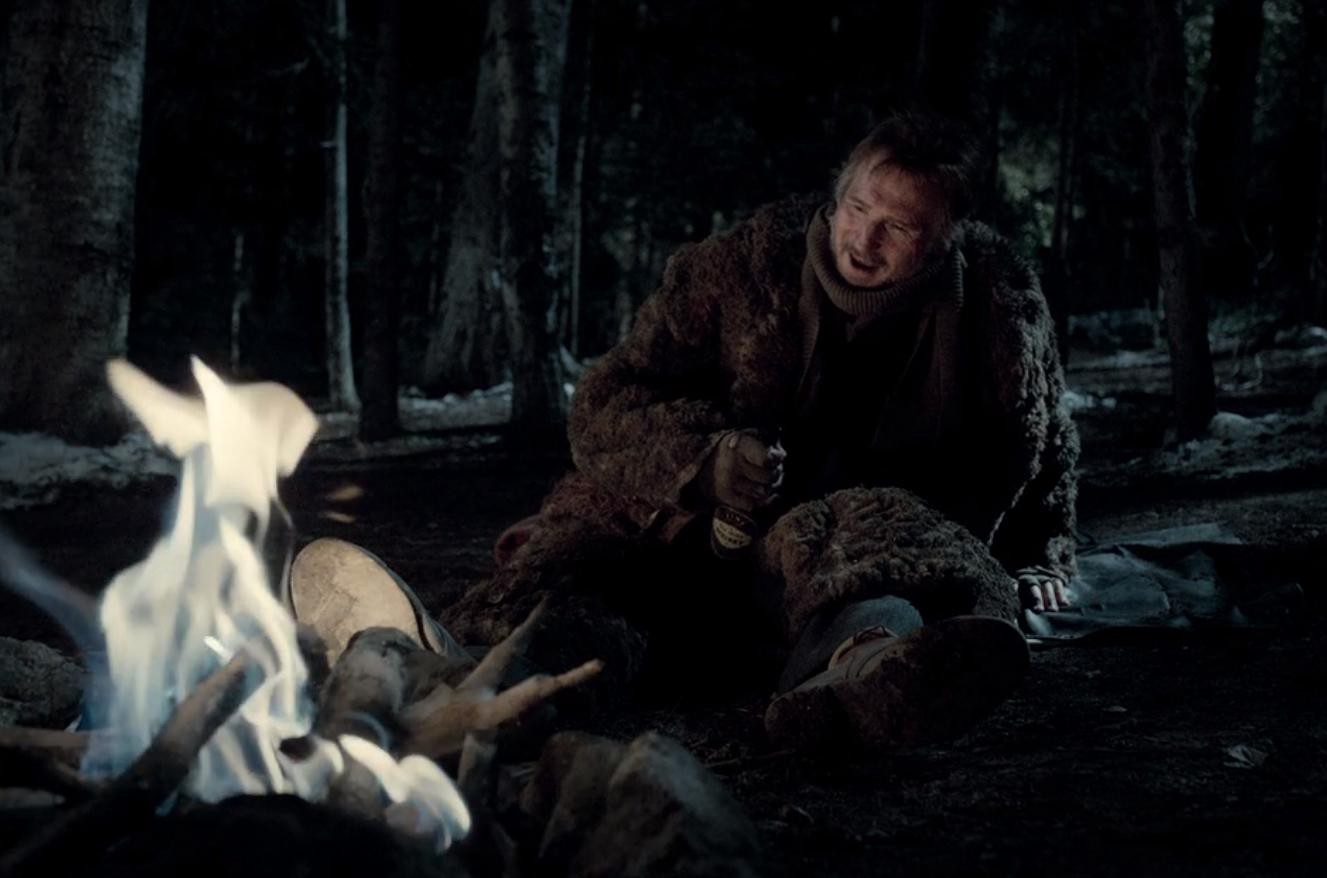 The pivotal scene
The pivotal scene
Dividing this montage of performances from the Artist?s final show is a sequence structured so as to cast the Impresario?s virtue into serious doubt for the first time. Sitting by the campfire, the Impresario drinks an entire bottle of booze while singing old Irish songs. Professor Hastings watches in wordless dread ? he knows it?s no good when his father figure gets to drinking, though we?re not sure why he knows it. His first song is ?Weila Walia,? a murder ballad about a poor single mother living by the riverside who kills her baby at the age of six months, and is hanged for the crime. He sings it flat on his back in an immobilized state. The second is ?The Sash Me Father Wore,? which concerns the multigenerational history of warfare between Kings who fought for provenance over Ireland, and how Ireland remains a unified nation long after those Kings have died. This one clearly relates to the American Civil War, and to the patrilineal pride whose faint equivalent between our lead characters is decomposing before our eyes. There?s something else going on in this scene, too: We see the Impresario?s longing for the stage. He directs his second song to the Artist in a performative fashion, his little show for an audience of one, revisiting the earlier part of his career when he would have worked as a showman MC for whatever circus or theatrical troupe is advertised all over his wagon. I didn?t catch this at first, but it?s there. He is pale and lifeless, desperate and hungry not only from the cold and solitude but from a paucity of that energy that can only be gotten by performing. We see the relieved and bashful smile on the Artist?s face after his first performance on screen is met with appreciative applause, and his own despair mounting when the people out there in the dark are cold to his exhortations. For the Impresario, that need is never met. He is sad-eyed and wistful as he moves through his duties as the producer of this show, and even in success he doesn?t get his fix.
Perhaps the ?Weila Walia? song points to the hidden truth of their past, and the missing mother who must have existed at some point in the Artist?s life? We might even wonder whether that untold tale accounts for the Artist?s trepidation at his caretaker?s increasing drunkenness. At any rate, there is no woman in the picture now, and with all this on his mind the Impresario straps the Artist to his back and heads into town to visit the local brothel. If money is scarce, then drinking a bottle of whiskey and buying a prostitute isn?t a very responsible decision. In her room, he sits the kid down and turns him around to face away from the bed, all without speaking to him, as if he?s an inanimate object. The absence of any friendship or familial affection is pointed, and Professor Hastings is saddened to know it. After the unseen coital exchange, we?re offered the only spoken conversation in this cryptic chapter:
?You wanna buy your friend some lovin???
?I don?t think so.?
?He ever had any??
??Once.?
Try as I might, I have been unable to form a satisfying theory of what is meant by this conversation. It must be important ? it?s the only dialogue in the whole chapter, for Pete?s sake, and presented at such a pivotal moment in the story. What happened on that one secret day when the Artist got a little lovin?? Why won?t the Impresario buy him a tumble ? is it sheer stinginess, coupled with a lack of regard for his partner, or is it something more? Whatever its meaning, we leave this sequence with our opinion of the Impresario upended. Previous scenes only hint at a dark side to their relationship. The drunken singing scene and subsequent trip to the brothel shove it right in your face.
We cut to the final, heartbreaking stage show, revisiting once again Shakespeare?s Sonnet 29 with its fierce affirmation of love for a loyal and steadfast friend. The sense of stillness and magic from the opening montage is gone, replaced by a noise of howling wind and an unromantic fixed full-body camera shot. The Artist seems shaken and defeated, his eyes hollow, his voice strained and cracking. Backstage, his father figure is half-asleep on his feet. The tiny audience is utterly unreceptive. Not a single clap arises at the overwrought climax of the Gettysburg address. Not a single penny is given to the Impresario, who for his part puts up little effort to solicit their money, dispensing with his usual hard-luck origin story. Having lost the support of the public, and therefore unable to inspire them to part with their money, the Artist has likewise been abandoned by his only friend. He leaves off Prospero?s speech in mid-sentence, overwhelmed with hopelessness, surrendering to the wind and the frigid indifference of everyone around him.
As he packs up after this devastating show, we get the best look yet at the words painted on the outside of the Impresario?s wagon. The wagon, like the Artist, is a constant reminder of all he once had that has since been lost. Lost in tragic reminiscence, the Impresario is roused by the sound of a cheering crowd, drawing him toward a grim turning point. Enter the miraculous counting chicken.
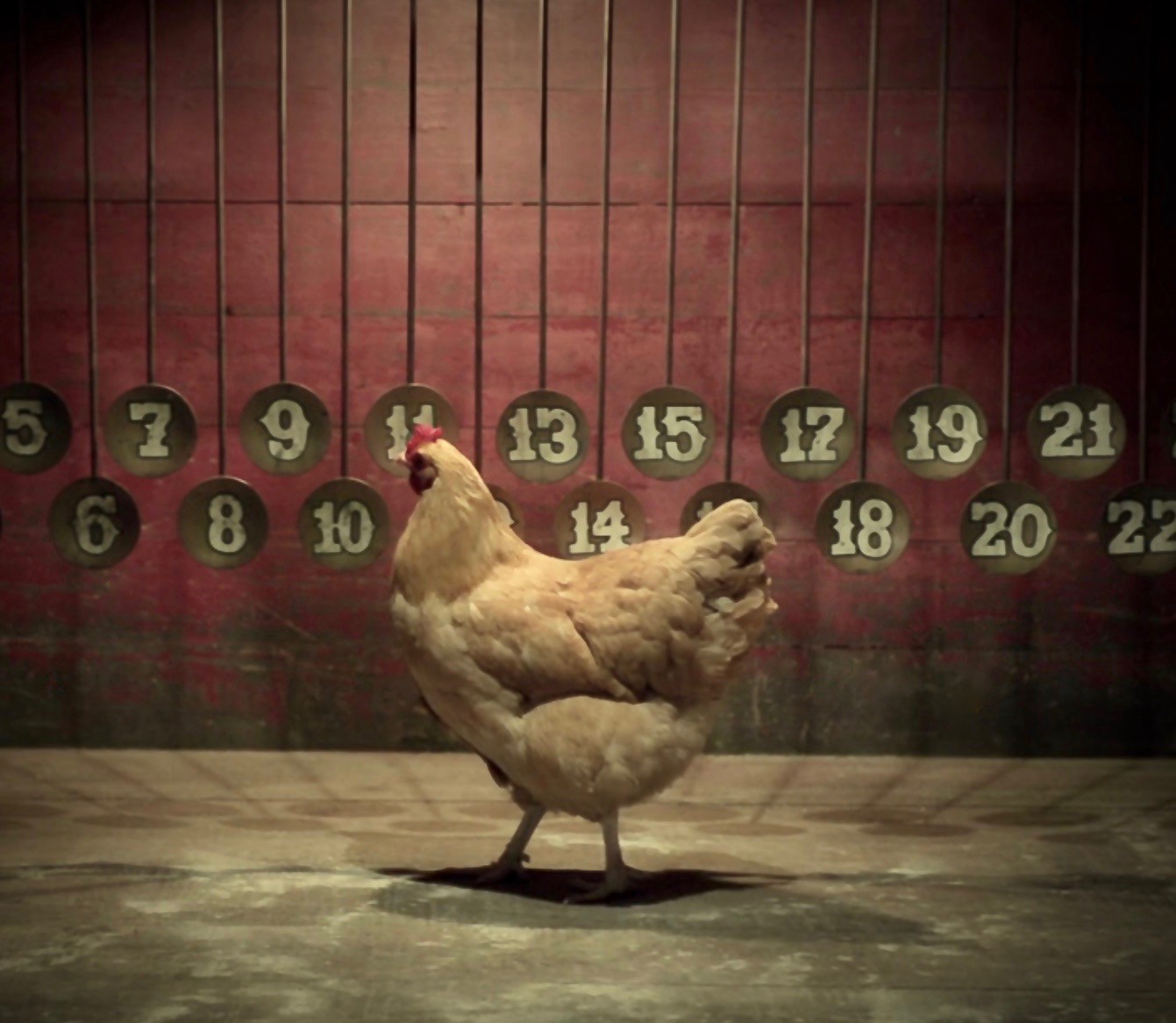 This episode?s unlikely antagonist
This episode?s unlikely antagonist
This is a real sideshow gag from the old-world carnival circuit, known as ?Bird Brain? and usually modelled as a chicken who can beat any man at Tic-Tac-Toe (a game that can be won every time by whoever makes the first move and knows the trick). The Impresario?s face lights up as he watches the act unfold. The man running the show is a talented barker, punctuating his patter with mildly clever jokes and the ringing of a bell. The crowd assembled at his wagon is miles away from the reverent silence of the Artist?s first audience, shouting out mathematical problems for the chicken to solve. This experience will not leave them transformed or enlightened, and offers them no new perspective or understanding. They will remember it, and speak of it, and caught up as they are in the moment they will surely give generously when the barker puts out his hat. The Impresario himself is taken in by the act, frowning and smirking from the front row. He could be that man, drinking in the life energy of that festive crowd like Thalia herself, with only the needs of a chicken to look after in his downtime. Post-show, he hands over a wad of bills in exchange for the chicken. The barker even throws in the bell for no additional fee.
In that moment, we see that things aren?t as bad financially as we might have inferred from earlier scenes. The amount he pays for the chicken is only about half of what he?s got in his hand. We see that the Impresario could have survived the Winter with the money he has socked away, avoiding the betrayal to come and looking for a financial backer or a gimmick that would improve his fortunes. Instead, he chooses the chicken over any sort of belief in or dedication to the Artist and his performance. He has given up on his creative work, his troupe, his show, and maybe his own flesh and blood; all for what he perceives as an easier ?meal ticket.? He has, as the kids say, ?sold out.?
What he doesn?t seem to understand is how the Bird Brain act works. I hesitate to give this secret up, former carny that I am; but there are foot pedals by which the handler causes the targets to move slightly, and the chicken has been taught to peck the moving target. Thus, if the Impresario has purchased the chicken without also having purchased the worked rig, then he has been outsmarted and cheated by a rival showman, and will receive his own comeuppance when he finds that the chicken can?t actually do math. The barker, meanwhile, need only buy any chicken in the world and take a little time to train it; and he?s back in business. I wonder if the Coen Brothers even know this? When we see the Impresario driving a wagon a couple scenes later, he?s still at the reins of Thalia?s Sedan, and there?s no sign of any new cargo taking up space inside or on top. From his own perspective, the Impresario has made a tough but smart decision that will improve his life in exchange for the life of his only friend (who is or might as well be his son). In reality, he has played himself.
Our final scene around the camp fire, wordless as always, shows the Impresario bringing a bag of chicken feed for his new star performer. The Artist?s face is accusatory, as if he already knows what?s coming. If he gets his stew that night, we don?t see it. The Impresario?s returned expression shows some regret, but his smile seems genuine enough. He seems happy to let his friend go hungry, with a sense of renewed hope for his own future. The rest happens quickly and quietly. He finds a high cliff over a river, tests its suitability by throwing over a big rock and watching it splash and submerge completely, then approaches his ward with that same rueful yet hopeful smile. When we see him next, he?s driving the wagon with a look of mild regret on his face, and the chicken is alone in back. The scene fades to show the closing passage in the written story, which describes the unfilmed scene of our Impresario carrying the Artist over to the bridge and dropping him off, then continuing along his way.
By the standards of the modern day, the Impresario is a terrible villain. He is a dissolute and selfish man who murders his helpless son because their show isn?t getting him enough of the money and satisfaction he desires. By the morals of the Wild West, the matter is not as clear, but still he falls short. Murder is OK, but it should be a fair fight. The weak and vulnerable should ideally be protected by the strong. Selfishness is OK, but loyalty to your partners is better, and family is among the most valuable things there is. His greatest failing as a man of the West is that he is a fool. He gave away half his money and murdered his partner and Meal Ticket, and all he has to show for it is a chicken and a bell.
I initially forgot to write about how all of this can also be viewed as an allegory for show business ? so on the nose, in fact, that it might not even count as an allegory. If Liam Neeson is a movie producer, Harry Melling is an indie film, and that trained chicken is a blockbuster (say Rian Johnson, Brick, and The Last Jedi, respectively). In this view, Showbiz itself is The Wild West, a comparison that has been made by a whole lot of idealistic young artists who left their home behind and headed to Los Angeles to strike it rich. The villainous and corrupted nature of the Impresario, and his willingness to toss his talented and loyal Artist off a bridge as soon as he thinks he?s found a path to easy money, is especially intriguing for the fact that the Coen Brothers themselves are both Artists and Impresarios. As writer/director/producers of this film and many others, they have a whole lot of helpless Artists depending on them to bring the crowds and do the work behind the scenes. But then, they?ve also got executive producers, financiers, and studio executives who are always counting pennies and watching jealously as their rivals clean up with nothing to worry about but chicken feed.
There?s only one happy ending in The Ballad of Buster Scruggs, coming up next in Chapter 4 with the world?s greatest living songwriter in a comedic solo performance that turns the sun right back on after this gruelling affair. ?Meal Ticket? is the darkest of them all, playing the destruction of its lead characters not for laughs but for sorrow. It?s a fable of sorts, a simple and symbolic tale made to express a moral lesson. This story shows us how the Wild West will eat a man alive if he has any weakness, any softness. It shows us how a dream is such a weakness, and love is such a weakness. To make it in the West, you must be hard. You must be resolute. You must cleave to the code of Western virtue when trying times come, or you will fail and be ruined.
See you next time, hombre. ? N.
